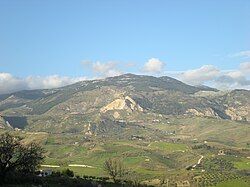Province of Agrigento
Province of Agrigento
| |
|---|---|
 Monte delle Rose (IT), Mountain of Roses (EN), Muntagna de Rosi (Sicilian), Mali i Trëndafilët (Arbëreshe) | |
 Map highlighting the location of the province of Agrigento in Italy | |
| Coordinates: 37°19′N 13°35′E / 37.317°N 13.583°E | |
| Country | |
| Region | |
| Capital(s) | Agrigento |
| Comuni | 43 |
| Government | |
| • President | Eugenio D'Orsi |
| Area | |
• Total | 3,042 km2 (1,175 sq mi) |
| Population (30 June 2009) | |
• Total | 454,370 |
| • Density | 150/km2 (390/sq mi) |
| GDP | |
| • Total | €6.558 billion (2015) |
| • Per capita | €14,690 (2015) |
| Time zone | UTC+1 (CET) |
| • Summer (DST) | UTC+2 (CEST) |
| Postal code | 92100, 92010-92029 |
| Telephone prefix | 0922, 0925 |
| Vehicle registration | AG |
| ISTAT | 084 |
| Website | www |
The province of Agrigento (Italian: provincia di Agrigento; Sicilian: pruvincia di Girgenti) is a province in the autonomous island region of Sicily, Italy, situated on its south-western coast. Following the suppression of the Sicilian provinces, it was replaced in 2015 by the Free Municipal Consortium of Agrigento (Italian: libero consorzio comunale di Agrigento). It has an area of 3,041.90 square kilometres (1,174.48 sq mi), and a total population of 474,493.[2] There are 43 comuni (sg.: comune) in the province.[3]
History and location
[edit]It is surrounded by province of Palermo in the north, Trapani in the west, Mediterranean Sea in the south, and Caltanissetta in the east. Gela inhabitants founded the province in the 6th century BC as Akragas. Carthage destroyed the province in 406 BC, but it was later ruled by the Romans, Goths, Byzantines, and Arabs. The Arabs rebuilt several parts of the province. Several ancient Doric temples were constructed during the 6th and 5th century BC to worship Hercules, Jupiter, Juno, Castor, Pollux, and Demeter. They are located in the Valley of Temples (Italian: Valle dei Templi).[4] The ancient temples and other architectural structures were built using the stones of the hills near Capo San Marco.[5]
Places
[edit]Here below are listed the towns of the province with more than 10,000 inhabitants:
- Agrigento (58,273);
- Sciacca (40,068);
- Licata (36,113);
- Canicattì (35,530);
- Favara (31,751);
- Palma di Montechiaro (22,262);
- Ribera (18,492);
- Porto Empedocle (16,300);
- Raffadali (12,550);
- Menfi (12,262);
- Ravanusa (11,108).[6]
Agrigento is the birthplace of the noted writer Luigi Pirandello and the philosopher Empedocles.[3] According to the government records the number of unemployed people is about 17% of the total labour force.[2] The province faces the Channel of Sicily in the south and is known for its beaches. Torre Salsa's beaches have been designated natural reserves and are protected due to their environmental importance.[5]
Wine production
[edit]The province is well known for its vineyards and wines. The total area covered by vineyards in 1984 was almost triple to that in 1949.[7] During this period Marsala based wine merchants used the grapes produced in the province to produce Marsala wine. In 1984 the local government passed a law that regulated this practice.[8] Around three-quarters of the Sicilian land devoted to growing Fiano grapes is in the province.[9] Some of the important municipalities known for their vineyards include Sambuca di Sicilia, Menfi, and Santa Margherita di Belice.[10]
Transportation
[edit]The road network in the province comprises 540 km. of street roads, 1,000 km. of provincial roads, 260 km. of communal roads and 56 km. of regional roads. 55% of the total rail network is suitable for electric trains.[2]
See also
[edit]References
[edit]- ^ Regions and Cities > Regional Statistics > Regional Economy > Regional Gross Domestic Product (Small regions TL3), OECD.Stats. Accessed on 16 November 2018.
- ^ a b c "Some data about the Province of Agrigento". Sicilia.it. Retrieved 18 September 2014.
- ^ a b "Provincia di Agrigento". Agrigento-Sicilia. Retrieved 18 September 2014.
- ^ "The province of Agrigento and it's cities". Sicilybella. Retrieved 18 September 2014.
- ^ a b Touring Club of Italy (2005). Authentic Sicily. Touring Editore. p. 120. ISBN 978-88-365-3403-6.
- ^ "Comuni della Provincia di Agrigento per popolazione" (in Italian).
- ^ Nesto & Savino 2013, p. 198.
- ^ Nesto & Savino 2013, p. 170.
- ^ Nesto & Savino 2013, p. 95.
- ^ Touring Club of Italy (2002). The Italian Food Guide: The Ultimate Guide to the Regional Foods of Italy. Touring Editore. p. 567. ISBN 978-88-365-2538-6.
Bibliography
[edit]- Nesto, Bill; Savino, Frances Di (2013). The World of Sicilian Wine. University of California Press. ISBN 978-0-520-95507-3.


